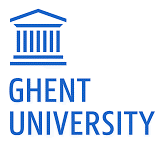
Ghent University (UGent) is a Belgium University. Today Ghent University attracts over 41,000 students, with a foreign student population of about 10% (30% of PhD students). In 2016, the university invested over 297 million Euros in research projects on behalf of public and private partners, and employed around 7,300 academic staff members. Ghent University is ranked 69nd in the Shanghai and 107th in the Times ranking. The University has participated in more than 200 research projects in the EU’s Sixth Framework Programme (2002-2006) and in 263 research projects in the Seventh Framework Programme, of which it coordinated 42 collaborative projects. Up till now, Ghent University is under H2020 (the new Framework Programme (2014-2020)) involved in around 180 projects, and coordinates 15 of them. The university is one of the fastest growing European universities in terms of research capacity and productivity, and its commitment to European research excellence is reflected by the recent extension of the ‘European Office’ in its Research Office, i.e. the department overseeing, guiding and administering research projects. It hosts 49 ERC grant holders (27 under FP7 and 22 under H2020) and acquired 46 Marie Skłodowska Curie fellowships (26 under FP7 and 20 under H2020). In H2020, it is involved in 29 ITN projects (4 as coordinator).
In this project, the Department of Electrical Energy, Metals, Mechanical Constructions & Systems (EEMMECS) of UGent will join. The relevant competencies of EEMMECS are (i) electrical machines, and (ii) experimental tribology. The research unit experimental tribology (PI: Prof. Patrick De Baets), has a longstanding expertise in experimental simulation and analysis of friction, friction stability and wear in dry or marginally lubricated conditions, considering advanced materials e.g. fibre reinforced composites, high temperature ceramics and self-lubricating materials. The research unit electrical machines (PI: Peter Sergeant), has a strong track record in the modelling, design, testing and control of electrical machines ranging from smaller to larger machines, we study both traditional machines as well as special machines.
The involved professors are supported in their industry oriented activities by a business developer (Jeroen De Maeyer). Furthermore, we are a core lab of Flanders Make, the strategic research centre of the Flemish government for the manufacturing industry. Peter Sergeant is principal investigator for the cluster Motion Products, Kurt Stockam is the core lab representative. https://www.ugent.be/ea/eemmecs/en
Role in the Project
The activities of UGent in this project are related to the PTO. More specifically, an advanced high-efficient axial flux permanent magnet synchronous generator will be developed and a scale-model will be constructed for lab testing. A full multi-dimensional model-based predictive control system for the machine-side will be developed which is capable of controlling the turbine and PTO to track the power reference as desired by the grid-side control.

